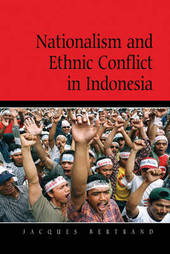
|
Nationalism and Ethnic Conflict in Indonesia
Hardback
Main Details
| Title |
Nationalism and Ethnic Conflict in Indonesia
|
| Authors and Contributors |
By (author) Jacques Bertrand
|
| Series | Cambridge Asia-Pacific Studies |
|---|
| Physical Properties |
| Format:Hardback | | Pages:304 | | Dimensions(mm): Height 238,Width 160 |
|
| ISBN/Barcode |
9780521818896
|
| Classifications | Dewey:320.5409598 |
|---|
| Audience | | Professional & Vocational | |
|---|
|
Publishing Details |
| Publisher |
Cambridge University Press
|
| Imprint |
Cambridge University Press
|
| Publication Date |
19 December 2003 |
| Publication Country |
United Kingdom
|
Description
Since 1998, which marked the end of the thirty-three-year New Order regime under President Suharto, there has been a dramatic increase in ethnic conflict and violence in Indonesia. In his innovative and persuasive account, Jacques Bertrand argues that conflicts in Maluku, Kalimantan, Aceh, Papua, and East Timur were a result of the New Order's narrow and constraining reinterpretation of Indonesia's 'national model'. The author shows how, at the end of the 1990s, this national model came under intense pressure at the prospect of institutional transformation, a reconfiguration of ethnic relations, and an increase in the role of Islam in Indonesia's political institutions. It was within the context of these challenges, that the very definition of the Indonesian nation and what it meant to be Indonesian came under scrutiny. The book sheds light on the roots of religious and ethnic conflict at a turning point in Indonesia's history.
Author Biography
Jacques Bertrand is Assistant Professor of Political Science at the University of Toronto.
Reviews'... excellent and thoroughly researched ... This is a very well written book that should be read not only by Indonesianists ... Bertrand's exploration of the links between an increasingly politicized Muslim community, the state and emerging conceptions of nationhood is particularly timely ... This is an important and valuable book, made more so by its implict comparativist perspective and it could be read with profit as much in the Balkans as in Southeast Asia.' Ethnic & Racial Studies
|